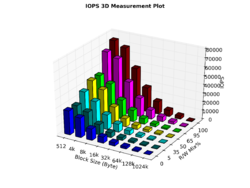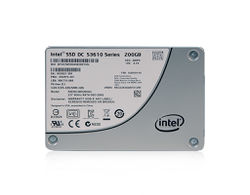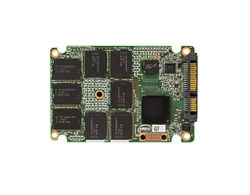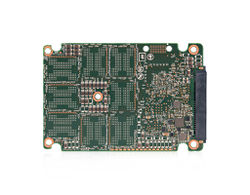Intel DC S3610 Series SSDs
| Hinweis: Bitte beachten Sie, dass dieser Artikel / diese Kategorie sich entweder auf ältere Software/Hardware Komponenten bezieht oder aus sonstigen Gründen nicht mehr gewartet wird. Diese Seite wird nicht mehr aktualisiert und ist rein zu Referenzzwecken noch hier im Archiv abrufbar. |
|---|
Dieser Artikel enthält Detail-Informationen zu Intel DC S3610 Series SSDs. Einen Überblick über alle Intel SSD Serien zeigt der Artikel Intel SSDs im Überblick.

Allgemeine Informationen
- SSD Serie: Intel DC S3610
- Datenblätter:
- Formfaktor: 1,8" und 2,5"
- NAND Flash Memory: MLCStrukturbreite: * 20nm
- Schnittstelle: SATA 6 Gb/s ("SATA III")
- Weitere Informationen:
- Intel SSD DC S3610 Series (ark.intel.com)
- Intel Solid-State Drive Data Center Tool (Kommandozeilen-Werkzeug zur Verwaltung von Intel SSDs)
- Besonderheiten:
- Intel 2nd Generation SATA 6Gbps Controller
- High Endurance Technology
- High I/O and throughput performance
- Consistent I/O latency
- Enhanced power-loss data protection / Power loss protection capacitor self-test
- End-to-End data protection
- Thermal throttling
- Temperature monitor and logging
TKperf Testreport
Intel DC S3610 TKperf Testreport
Modelle
| SSD | Kapazität (netto) |
Kapazität (brutto) |
Spare Area (GB und % zus. zur Netto-Kap.) |
Flash-Chips | Haltbarkeit (Endurance) |
Durchsatz (max. Bandbreite) |
IOPS (max. Random IOPS Performance) | |||
|---|---|---|---|---|---|---|---|---|---|---|
| Lesen | Schreiben | Lesen | Schreiben (über erste 8 GiB) |
Schreiben (über ges. Datenbereich) | ||||||
| SSDSC2BX100G401 | 100 GB (100030242816 Byte) |
unbek. | unbek. | unbek. | 0,5 PB | 410 MB/s | 110 MB/s | 82.000 IOPS | n/a | 6.500 IOPS |
| SSDSC2BX200G401 | 200 GB (200049647616 Byte) |
128 GiB (257,7 GB) | 57,7 GB (28,8%) |
1x16 GiB 29F16B08LCMFP + 7x32 GiB 29F32B08MCMFP |
1,1 PB | 550 MB/s | 230 MB/s | 84.000 IOPS | n/a | 12.000 IOPS |
| SSDSC2BX400G401 | 400 GB (400088457216 Byte) |
unbek. | unbek. | unbek. | 3,0 PB | 550 MB/s | 400 MB/s | 84.000 IOPS | n/a | 25.000 IOPS |
| SSDSC2BX480G401 | 480 GB (480103981056 Byte) |
unbek. | unbek. | unbek. | 3,7 PB | 550 MB/s | 450 MB/s | 84.000 IOPS | n/a | 28.000 IOPS |
| SSDSC2BX800G401 | 800 GB (800166076416 Byte) |
unbek. | unbek. | unbek. | 5,3 PB | 550 MB/s | 520 MB/s | 84.000 IOPS | n/a | 28.000 IOPS |
| SSDSC2BA012T401 | 1200 GB (1200243695616 Byte) |
unbek. | unbek. | unbek. | 8,6 PB | 550 MB/s | 500 MB/s | 84.000 IOPS | n/a | 28.000 IOPS |
| SSDSC2BX016T401 | 1600 GB (1600321314816 Byte) |
unbek. | unbek. | unbek. | 10,7 PB | 550 MB/s | 500 MB/s | 84.000 IOPS | n/a | 27.000 IOPS |
Testberichte
- Intel Launches SSD DC S3610 & S3710 Enterprise SSDs (anandtech.com), 03.02.2015
- Review and test Intel DC S3610: server SSD in a desktop (unlockpwd.com)
Firmware
| Date | Revision | Description |
|---|---|---|
| January 2017 | G2010160 | Information from Intel Solid-State Drive Data Center Tool 3.4.3 Release Notes:[1] The following changes are included in this firmware update:
This latest firmware also includes a fix for the potential issue that incorrect data may be read during resume from low power state. |
| March 2016 | G2010150 | Information from Intel Solid-State Drive Data Center Tool 3.0.2 Release Notes:[2] The following changes are included in this firmware update:
This latest firmware also includes a fix for a specific use condition where in certain cases if the device receives a command that violates the SATA protocol specification, the drive may ASSERT or stop responding to host commands (See Intel Advisory INTEL-SA-00050). |
| August 2015 | G2010140 | Information from Intel Solid-State Drive Data Center Tool 2.3.1 Release Notes:[3] This firmware revision has several continuous improvement optimizations intended to provide the best possible user experience with the Intel SSD. The following issues are also fixed in this release:
Additional: Fix for "READ/WRITE FPDMA QUEUED" ATA commands or "SCSI Task Abort".[4] Siehe dazu auch Syslog meldet task abort bei Intel SSDs. |
| - | G2010110 | Initial firmware. (seen on a 200 GB SSD) |
| - | G201DL20 | Firmware of sample devices. (seen on a 200 GB sample SSD) |
Quelle: Firmware Release Notes oder Auslesen von SSD-Informationen.
Programmausgaben
smartctl
smartctl 6.5 2016-01-24 r4214 [x86_64-linux-4.4.0-57-generic] (local build)
Copyright (C) 2002-16, Bruce Allen, Christian Franke, www.smartmontools.org
=== START OF INFORMATION SECTION ===
Model Family: Intel 730 and DC S35x0/3610/3700 Series SSDs
Device Model: INTEL SSDSC2BX480G4
Serial Number: BTHC538504EE480MGN
LU WWN Device Id: 5 5cd2e4 04c0f2f43
Firmware Version: G2010150
User Capacity: 480.103.981.056 bytes [480 GB]
Sector Size: 512 bytes logical/physical
Rotation Rate: Solid State Device
Form Factor: 2.5 inches
Device is: In smartctl database [for details use: -P show]
ATA Version is: ACS-2 T13/2015-D revision 3
SATA Version is: SATA 2.6, 6.0 Gb/s (current: 6.0 Gb/s)
Local Time is: Thu Jan 5 10:03:52 2017 CET
SMART support is: Available - device has SMART capability.
SMART support is: Enabled
=== START OF READ SMART DATA SECTION ===
SMART Status not supported: ATA return descriptor not supported by controller firmware
SMART overall-health self-assessment test result: PASSED
Warning: This result is based on an Attribute check.
General SMART Values:
Offline data collection status: (0x00) Offline data collection activity
was never started.
Auto Offline Data Collection: Disabled.
Self-test execution status: ( 0) The previous self-test routine completed
without error or no self-test has ever
been run.
Total time to complete Offline
data collection: ( 0) seconds.
Offline data collection
capabilities: (0x79) SMART execute Offline immediate.
No Auto Offline data collection support.
Suspend Offline collection upon new
command.
Offline surface scan supported.
Self-test supported.
Conveyance Self-test supported.
Selective Self-test supported.
SMART capabilities: (0x0003) Saves SMART data before entering
power-saving mode.
Supports SMART auto save timer.
Error logging capability: (0x01) Error logging supported.
General Purpose Logging supported.
Short self-test routine
recommended polling time: ( 1) minutes.
Extended self-test routine
recommended polling time: ( 2) minutes.
Conveyance self-test routine
recommended polling time: ( 2) minutes.
SCT capabilities: (0x003d) SCT Status supported.
SCT Error Recovery Control supported.
SCT Feature Control supported.
SCT Data Table supported.
SMART Attributes Data Structure revision number: 16443
Vendor Specific SMART Attributes with Thresholds:
ID# ATTRIBUTE_NAME FLAG VALUE WORST THRESH TYPE UPDATED WHEN_FAILED RAW_VALUE
5 Reallocated_Sector_Ct 0x0032 100 100 000 Old_age Always - 0
9 Power_On_Hours 0x0032 100 100 000 Old_age Always - 2317
12 Power_Cycle_Count 0x0032 100 100 000 Old_age Always - 227
170 Available_Reservd_Space 0x0033 100 100 010 Pre-fail Always - 0
171 Program_Fail_Count 0x0032 100 100 000 Old_age Always - 0
172 Erase_Fail_Count 0x0032 100 100 000 Old_age Always - 0
174 Unsafe_Shutdown_Count 0x0032 100 100 000 Old_age Always - 208
175 Power_Loss_Cap_Test 0x0033 100 100 010 Pre-fail Always - 7230 (6 1103)
183 SATA_Downshift_Count 0x0032 100 100 000 Old_age Always - 0
184 End-to-End_Error 0x0033 100 100 090 Pre-fail Always - 0
187 Reported_Uncorrect 0x0032 100 100 000 Old_age Always - 0
190 Temperature_Case 0x0022 073 055 000 Old_age Always - 27 (Min/Max 27/45)
192 Unsafe_Shutdown_Count 0x0032 100 100 000 Old_age Always - 208
194 Temperature_Internal 0x0022 100 100 000 Old_age Always - 27
197 Current_Pending_Sector 0x0012 100 100 000 Old_age Always - 0
199 CRC_Error_Count 0x003e 100 100 000 Old_age Always - 0
225 Host_Writes_32MiB 0x0032 100 100 000 Old_age Always - 776228
226 Workld_Media_Wear_Indic 0x0032 100 100 000 Old_age Always - 65535
227 Workld_Host_Reads_Perc 0x0032 100 100 000 Old_age Always - 65535
228 Workload_Minutes 0x0032 100 100 000 Old_age Always - 65535
232 Available_Reservd_Space 0x0033 100 100 010 Pre-fail Always - 0
233 Media_Wearout_Indicator 0x0032 100 100 000 Old_age Always - 0
234 Thermal_Throttle 0x0032 100 100 000 Old_age Always - 0/0
241 Host_Writes_32MiB 0x0032 100 100 000 Old_age Always - 776228
242 Host_Reads_32MiB 0x0032 100 100 000 Old_age Always - 253375
243 NAND_Writes_32MiB 0x0032 100 100 000 Old_age Always - 1200720
SMART Error Log Version: 1
No Errors Logged
SMART Self-test log structure revision number 1
No self-tests have been logged. [To run self-tests, use: smartctl -t]
SMART Selective self-test log data structure revision number 1
SPAN MIN_LBA MAX_LBA CURRENT_TEST_STATUS
1 431174464005 7205814418028888064 Not_testing
2 581988 234627151180300 Not_testing
3 7205816209030250496 100 Not_testing
4 431174464171 7205815118108557312 Not_testing
5 100 222532523274926 Not_testing
Selective self-test flags (0x0):
After scanning selected spans, do NOT read-scan remainder of disk.
If Selective self-test is pending on power-up, resume after 0 minute delay.
hdparm
/dev/sda:
ATA device, with non-removable media
Model Number: INTEL SSDSC2BX200G4
Serial Number: BTHC505304N8200TGN
Firmware Revision: G2010110
Media Serial Num:
Media Manufacturer:
Transport: Serial, ATA8-AST, SATA 1.0a, SATA II Extensions, SATA Rev 2.5, SATA Rev 2.6
Standards:
Used: unknown (minor revision code 0x0110)
Supported: 9 8 7 6 5
Likely used: 9
Configuration:
Logical max current
cylinders 16383 16383
heads 16 16
sectors/track 63 63
--
CHS current addressable sectors: 16514064
LBA user addressable sectors: 268435455
LBA48 user addressable sectors: 390721968
Logical Sector size: 512 bytes
Physical Sector size: 4096 bytes
Logical Sector-0 offset: 0 bytes
device size with M = 1024*1024: 190782 MBytes
device size with M = 1000*1000: 200049 MBytes (200 GB)
cache/buffer size = unknown
Form Factor: 2.5 inch
Nominal Media Rotation Rate: Solid State Device
Capabilities:
LBA, IORDY(can be disabled)
Queue depth: 32
Standby timer values: spec'd by Standard, no device specific minimum
R/W multiple sector transfer: Max = 1 Current = 1
DMA: mdma0 mdma1 mdma2 udma0 udma1 udma2 udma3 udma4 udma5 *udma6
Cycle time: min=120ns recommended=120ns
PIO: pio0 pio1 pio2 pio3 pio4
Cycle time: no flow control=120ns IORDY flow control=120ns
Commands/features:
Enabled Supported:
* SMART feature set
Security Mode feature set
* Power Management feature set
Write cache
* Look-ahead
* Host Protected Area feature set
* WRITE_BUFFER command
* READ_BUFFER command
* NOP cmd
* DOWNLOAD_MICROCODE
SET_MAX security extension
* 48-bit Address feature set
* Mandatory FLUSH_CACHE
* FLUSH_CACHE_EXT
* SMART error logging
* SMART self-test
* General Purpose Logging feature set
* WRITE_{DMA|MULTIPLE}_FUA_EXT
* 64-bit World wide name
* IDLE_IMMEDIATE with UNLOAD
* WRITE_UNCORRECTABLE_EXT command
* {READ,WRITE}_DMA_EXT_GPL commands
* Segmented DOWNLOAD_MICROCODE
unknown 119[6]
* Gen1 signaling speed (1.5Gb/s)
* Gen2 signaling speed (3.0Gb/s)
* Gen3 signaling speed (6.0Gb/s)
* Native Command Queueing (NCQ)
* Phy event counters
* READ_LOG_DMA_EXT equivalent to READ_LOG_EXT
* Software settings preservation
* SMART Command Transport (SCT) feature set
* SCT Write Same (AC2)
* SCT Error Recovery Control (AC3)
* SCT Features Control (AC4)
* SCT Data Tables (AC5)
* reserved 69[4]
* Data Set Management TRIM supported (limit 4 blocks)
* Deterministic read ZEROs after TRIM
Security:
Master password revision code = 65534
supported
not enabled
not locked
not frozen
not expired: security count
supported: enhanced erase
4min for SECURITY ERASE UNIT. 4min for ENHANCED SECURITY ERASE UNIT.
Logical Unit WWN Device Identifier: 55cd2e404b78129e
NAA : 5
IEEE OUI : 5cd2e4
Unique ID : 04b78129e
Checksum: correct
Einzelnachweise
- ↑ Intel Solid State Drive Data Center Tool Release Notes - January 2017 - Version 3.4.3 (downloadmirror.intel.com)
- ↑ Intel Solid State Drive Data Center Tool Release Notes - August 2016 - Version 3.0.2 (downloadmirror.intel.com)
- ↑ Intel Solid State Drive Data Center Tool Release Notes - November 2015 - Version 2.3.1 (downloadmirror.intel.com)
- ↑ S3610 SSDs have failed "READ/WRITE FPDMA QUEUED" ATA commands, frozen, then link reset (communities.intel.com)
|
Autor: Thomas Niedermeier Thomas Niedermeier arbeitet im Product Management Team von Thomas-Krenn. Er absolvierte an der Hochschule Deggendorf sein Studium zum Bachelor Wirtschaftsinformatik. Seit 2013 ist Thomas bei Thomas-Krenn beschäftigt und kümmert sich unter anderem um OPNsense Firewalls, das Thomas-Krenn-Wiki und Firmware Sicherheitsupdates. |




